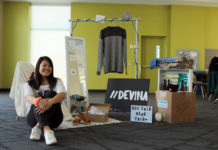For the first time in Canada, through an intensive language program, Renison University College will be offering students the opportunity to learn introductory Arabic over four to eight weeks in the Spring 2016 term. </p>
Titled the Arabic Summer Institute (ASI), this program will offer students courses in Arabic language as well as a culture course. All courses will be accessible through Quest during the course selection period.
“There is no more, in my view, important language or culture to be in active conversation with than the language of the Islamic world and understanding all the geo-political and cultural realties of a world that is distinct from our own. So it’s very timely,” said principal and vice-chancellor of Renison Wendy Fletcher.
Prof. Idrisa Pandit, director of studies in Islam, acknowledges that not everyone who practises Islam speaks Arabic, with only 20 per cent of the Muslim population speaking the language. She explains that the percentage still represents 250 million people.
With Waterloo and Kitchener becoming home to many Syrian newcomers, Pandit spoke about the connecting capacity that learning new languages can have. Pandit and Fletcher’s goal is to encourage conversation.
“Enabling a person to understand the cultural context and the linguistic background and giving them some tools, enables that conversation,” Pandit said.
Through intensive language programs students are exposed to very concentrated learning. At Renison’s English Language Institute, there are many native Arabic speakers, who will become conversation partners to the future students of the ASI program.
“Intensive programs are obviously geared to focus language learning,” Pandit said. “[Partnership] helps us create in a way an environment these students would encounter if they want to learn the language in an Arabic country.”
Classes will run anywhere from two to six hours a day, Monday to Thursday, featuring lectures, labs, and tutorials. Depending on student preferences, the courses may also include field trips to relevant restaurants or cultural spots. Credits earned through the ASI program will be transferable to other programs, can be used to fulfill breadth requirements, and are also available to non-degree students.
“We see it as a great opportunity for professional development especially with all of the local agencies that are looking to train their staff,” Pandit said.
“This is a great time for them to consider [the program] and for people to come back to school and have a student experience once again.”






























